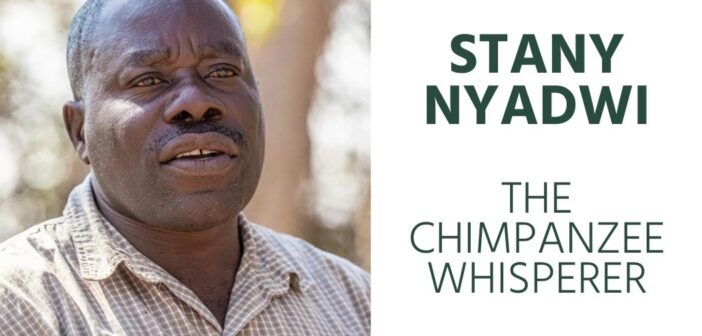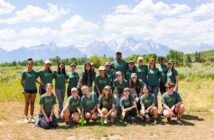Dr. Goodall is well-known for her remarkable ability to immerse herself in chimpanzee culture and life. Because of her compassion and observational skills, she was able to enter into their world in a remarkable way, providing one-of-a-kind insights. Her story, and her ability to tell their story, transformed our relationship to the rest of the animal kingdom. Someone else who has immersed himself in a similar way and share chimpanzee stories is Stany Nyadwi, a leading chimpanzee caregiver and the primate manager at JGI South Africa’s Chimp Eden sanctuary. Like Jane, his story is most certainly one of hope, but also of hardship, compassion, and perseverance.
Stany grew up in rural Burundi, where he had few educational and career opportunities. After receiving an elementary school education, he left home at 15 to work in the Burundian capital city, Bujumbura. It was difficult work, so when he was offered a gardening job at Halfway House—the new JGI chimpanzee sanctuary in Burundi—he took it. He had seen chimpanzees before, usually being bought by tourists through the cruel illegal wildlife trade. The sanctuary was created, as unfortunately happens across the chimpanzee range, in response to the growing need to rescue and rehabilitate those rescued from the illegal trade. Despite these bleak first interactions, Stany’s fascination with them was obvious from the beginning. The couple who ran the sanctuary at the time, Dean and Susan Anderson, saw how he would watch the chimpanzees during his breaks. They offered to train him, and so began his career caring for orphaned and rescued chimpanzees.
“It was clear from the start that he had a real gift for working with these creatures… He was able to communicate with them in a special way to the point that we called him a ‘chimpanzee whisperer.’” – Dr. Jane Goodall, DBE, founder of the Jane Goodall Institute, UN Messenger of Peace
During his time with the chimpanzees, Stany quickly found a natural affinity, and a skill for supporting their rehabilitation in his own special way. Jane and others even started referring to him as “the chimp whisperer” because of how he seemed to innately understand what they were thinking and feeling. His bond with chimpanzees became an essential source of comfort when civil war hit his home country, forcing him to flee to save the chimpanzees, and to avoid persecution himself. His family was unable to do the same, and he lost both parents and a brother to the violence. He could not contact his human family for four years, so the chimpanzees became his second family. Like him, their families had been broken apart, and so Stany and the chimpanzees were able to empathize with and help one another (Authority Magazine).
Stany has become a master of chimpanzee communication, and he has traveled the world telling his story wherever he goes. Having worked with many chimpanzees in Burundi, Kenya, Uganda, and in JGI South Africa’s Chimp Eden, he has many exciting tales and inspiring insights to share. The multi-award-winning mini-documentary, Pant Hoot—named for chimpanzees’ calls—captures just a portion of these as it tells the story of Stany’s life. It is interjected with commentary from Dr. Goodall and others, as well as beautiful videos of some of the chimpanzees he’s connected to over the years.
“Chimpanzees, they are 98.6 [percent similar]to humans. If you spend time with them, you can see that. But to me, because I have been with them for a long time, we can talk, we can chat.” – Stany Nyadwi, Pant Hoot
Stany’s most recent storytelling project has been his new book, The Chimpanzee Whisperer: A Life of Love and Loss, Compassion and Conservation, released February 22, 2022. In this memoir, he has the space to tell even more about his life, the chimpanzees, and his moving lifetime of work than ever before. By sharing these stories, interwoven with his own, he hopes to reach the hearts of people all over the world. In the storytelling legacy of Jane, by sharing about their close likeness to humans and their extraordinary lives, he aims to encourage people to understand the need to respect and protect this species, and all wildlife. With a little bit of hope, and considerable effort, he aims to create a world in which there will be no need for chimpanzee sanctuaries – and instead live freely in the wild.






